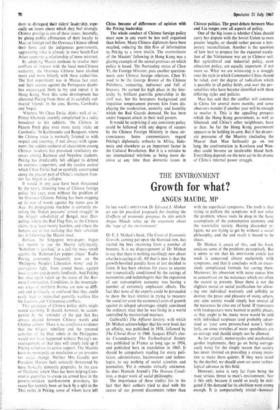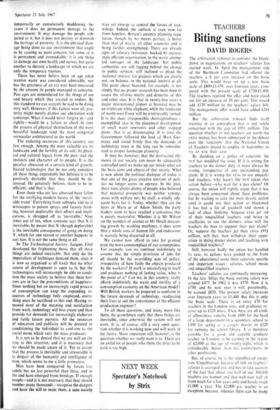Growth for what?
THE ENVIRONMENT ANGUS MAUDE, MP
In last week's SPECTATOR Dr Edward 1. Mishan set out his practical proposals for limiting the ill-effects of economic progress. In this article Angus Maude takes up the argument about the 'rape of the environment.'
Dr E. I. Mishan's book, The Costs of Economic Growth, coming pat upon the Stansted row, has started the bees swarming from a number of bonnets. It is no disparagement of Dr Mishan to say that there is nothing startlingly new about what he is saying at all. All that is new is that the growth-besotted pundits have at last decided to listen. It has been obvious for years to anyone not traumatically conditioned by the ravings of economists and technologists that the expansion of our consumption economy was having a number of extremely unpleasant effects. The fact that none of the experts could be persuaded to show the least interest in trying to measure the social (or even the economic) costs of growth against its alleged advantages simply convinced the ordinary man that he was living in a world controlled by mesmerised maniacs.
Galbraith's The Affluent Society, with which Dr Mishan acknowledges that his own book has an affinity, was published in 1958, followed by The Liberal Hour in 1960. Jacques Ellul's clas- sic Cassandra-cry The Technological Society was published in France as long ago as 1954, and published here in translation in 1965. It should be compulsory reading for every poli- tician, administrator, businessman and techno- logist, to say nothing of social scientists and journalists. Yet it remains virtually unknown. So does Hannah Arendt's The Human Condi- tion, a major work of social philosophy.
The importance of these studies lies in the fact that their authors tried to deal with the causes of our present discontents rather than with the superficial symptoms. The truth is that trying to palliate the symptoms will not solve the problem, whose roots lie deep in the basic assumptions of the consumption economy and the materialist society. Having discarded re- ligion, we are trying to get by without a social philosophy, and the end result is bound to be chaos.
Dr Mishan is aware of this, and his book analyses some of the problems perceptively. But it seems to me that his SPECTATOR article last week is concerned almost exclusively with symptoms, and that it concludes with an exces- sively complicated formula for curing them. Moreover, his obsession with noise causes him to concentrate on the nuisances which are often the easiest to prevent. Since there is not the slightest moral or social- justification for allow- s ing one individual wantonly and selfishly to destroy the peace and pleasure of many others, any sane society would simply ban several of the nuisances he cites out of hand. If transistors with loudspeakers were banned in public places, as they ought to be, many more would be sold with individual earpieces (and probably adver- tised as 'your own personalised noise'). Simi- larly, on some stretches of water speedboats are an outrage and should_ simply not be allowed.
As for aircraft, motor-cycles and mechanical garden implements, they go on being outrage- ously noisy for the simple reason that society has never insisted on providing a strong incen- tive to make them quieter. If they were taxed by the decibel, we should soon see some techno- logical advance in this field.
However, noise is very far from being the most serious threat to man's environment. Nor is this only because it could so easily be miti- gated if the demand for its abolition were strong enough. It is comparatively trivial—however temporarily or cumulatively maddening -be- cause it does no permanent damage to the environment. It may damage the people sub- jected to it, but it does not destroy or diminish the heritage of posterity. It is the physical dam- age being done to our environment that ought to be causing us most concern, for some of it is permanent and irremediable: it is one thing to damage our own health and nerves, but quite another to destroy a landscape of which we are only the temporary trustees.
There has never before been an age when wanton waste was considered admirable, nor has the greatness of an era ever been measured by the amount its people managed to consume. Past ages are remembered for the things of use and beauty which they created to endure. By this standard we can scarcely be said to be doing very well. However, if this failure were all, pos- terity might merely dismiss our aberration with contempt. What it would never forgive us—and rightly—would be a failure to check in time the process of physical destruction of the most beautiful landscape (and the most congenial vernacular architecture) in the world.
The enduring resources of this country are few enough. Among the most valuable are its landscape and the fertility of its soil; its physi- cal and cultural legacy from the past: and the instincts and character of its people. It is the peculiar obsession of a certain kind of growth- fixated technologist that he not only considers all these things expendable but believes it to be positively desirable that they should be de- stroyed. He genuinely believes them to be in- efficient; and that is that.
Even those who are less obsessed have fallen for the terrifying modern heresy of the 'inevit- able trend.' Everything from subtopia and rural wirescapes to poison sprays and factory farm- ing, however deplorable their effects and impli- cations, is shrugged off as 'inevitable.' Nine times out of ten, when someone says that X is inevitable, he means that X (though deplorable) is the inevitable consequence of going on doing Y, which for one reason or another happens to suit him. It is not the same thing at all.
In The Technological Society. Jacques Ellul developed the frightening thesis that all these things are indeed inevitable. Not. only do the imperatives of technique demand them, since it is now so organised at all levels -that no other course of development is opefi to it, but the technologists will increasingly be able to condi- tion the mass society to believe that these hor- rors are in fact the preconditions of happiness. Since nothing but an increasingly rapid process of consumption can keep the expanding re- sources of technology fully employed, every- thing must be sacrificed to this end. Having re- moved most of the meaning and satisfaction from work, technology will first create and then provide for demands for increasingly elaborate and futile leisure pursuits. All the resources of education and publicity will be devoted to conditioning the individual to conform to the social norm which suits the mass producers.
It is not to be denied that we are well on the way to this situation, and it is necessary that we should be made aware of it. Yet to accept that the process is inevitable and irreversible is to despair of the humanity and intelligence of men, which seems to me a little premature.
Men have been conquered by forces less subtle but no less powerful than these, and in the end have emerged from bondage. If enough people—and it is not necessary that they should number many thousands—recognise the dangers and have the will to resist them, a sane society
may yet emerge to control the forces of tech- nology. Indeed. the outlook is even now far from hopeless. Britain's amenity planning regu- lation. though by no means perfect, is better than that of marls all other countries and is being further strengthened. There are already signs of salutary resistance, backed by increas- ingly efficient organisation, to the worst attemp- ted outrages on the landscape. Yet public authorities are still lagging behind the change in public opinion. stilt inclined to plead the `national interest' for projects which are clearly not, on balance, in the national interest at all. The point about Stansted, for example. is not simply that no proper research has been done to assess the relative merits and demerits of this and other sites. It is that in twenty-five years a major international airport at Stansted may be an irrelevant white elephant, while the landscape of north-west Essex will be irretrievably ruined. It is the sheer irresponsible shortsightedness— exemplified also in the piecemeal development of small water reservoirs and other stopgap plans—that is so discouraging. It is time the Government followed the lead of West Ger- many and stated firmly that the demands of technology must in the long run be subordin- ated to proper landscape planning.
It may be, however, that the destructive ele- ments in our society can never be adequately controlled until we make up our minds what are the basic aims and objects of that society. What is new about the political dialogue of today is that one of the great creative tensions of poli- tics no longer seems to operate. In the past, there were always plenty of people who believed that material prosperity was neither synony- mous with welfare nor, by itself, a wholly ade- quate basis for it. Today, whether they are the heirs of Marx or of Adam Smith, the party leaders seem to have reached a consensus that is purely materialist. Whether it is Mr Wilson on the wonders of science or Mr Heath measur- ing growth by washing machines, it does seem - that a whole area of human life and endeavour is scarcely being discussed at all.
We cannot now afford to take for granted even the most commonplace of our assumptions. For example. can we continue indefinitely to assume that the simple provision of jobs for all should be the overriding aim Of policy. irrespective of how futile the objects produced by the workers? If work is unsatisfying in itself and produces nothing of lasting value, what is the point of it? Can we, in this country, really afford indefinitely the waste and sterility of a consumption economy on the American model? Will British workers be prepared to conform to the future demands of technology, readjusting their lives to suit the convenience of the efficient production engineer?
To all these questions, and many more like them, the growthmen reply that these things are inevitable, since otherwise the system will not work. It is, of course, still a very open ques- tion whether it is working now and will work in the future. More important still, however, is the question whether we really want it to. There are an awful lot of people who think the price to be paid is too high.































 Previous page
Previous page